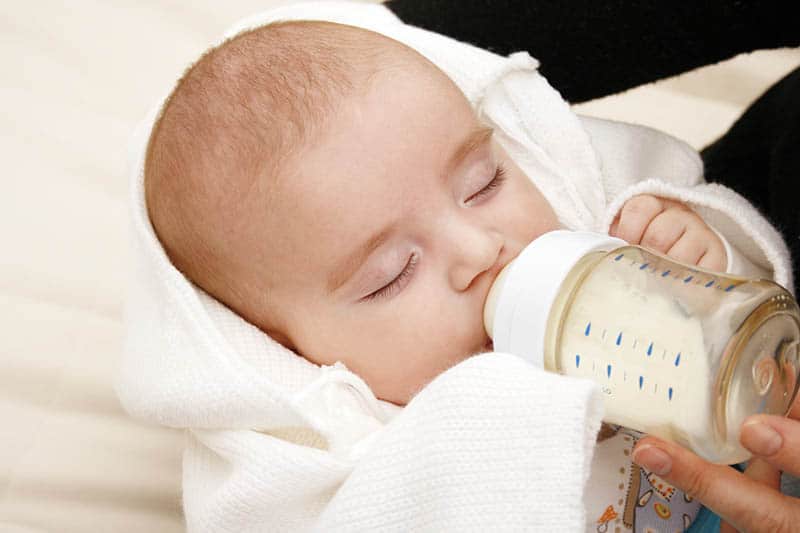No matter how prepared you are for having a baby, there are invariably so many questions that will arise as soon as your newborn enters this world, most of which revolve around whether your little one is healthy and developing properly.
You’d think that nursing is such a natural process that it shouldn’t cause difficulties, but I remember being a nervous wreck in those first days of breastfeeding.
I was petrified that I was underfeeding or overfeeding him, trying to ace his feeding schedule, and learning to read my baby’s hunger cues.
As a young nursing mom, I plagued our pediatrician and lactation consultant with an unending stream of concerns: How much does a newborn eat? How often? For how long? What signs of hunger should I look out for? and so many more.
Since your new little bundle is not doing much else than sleeping, feeding, and pooping in his first days, it’s understandable that you as a new parent want to get clued up on these three main activities, of which nutrition stands out as the most important.
After all, your baby’s overall health, growth, and development directly depend on it.
Although we all know that each child (and mother!) is unique, there are some basic guidelines that apply across the board for infant nutrition, regardless of whether you take the breastfeeding or formula feeding route.
For instance, in the first year, your baby needs to have milk (either breast milk or formula) as their main source of nutrition.
Also, as per recommendations by the American Academy of Pediatrics (AAP), it’s wise to hold off introducing solid foods to your baby until he is approximately 6 months old.
But if you’re confused about your newborn’s unpredictable appetite, unsure of the appropriate feeding times, and feel like you’re merely a perpetual on-tap milking machine, here are the answers to the most common feeding FAQs to making sure your newborn gets the right amount of milk for optimal health and growth.
Feeding FAQs

All you need to do is learn to follow his lead while keeping these general guidelines as a framework.
Before long, you’ll know your baby’s rhythm like the back of your hand and feeding will be second nature!
How much does a newborn eat per day?

Most breastfed newborns need between 8 and 12 feedings per 24-hour period, which translates to one feed every 2-3 hours.
For formula-fed babies, it’s usually between 3 and 4 hours.
This is counted from the start of feeds (not when baby has finished). For instance, if you start nursing your little one at 8 AM and breastfeed for 30 minutes, count from 8 AM (not 8:30).
All baby formulas come with age and weight appropriate guides to how much a baby should consume per feed and per day.
However, what makes nursing a little trickier than bottle feeding is that you can’t know for sure the exact amount of milk your baby is getting, as you can’t can’t measure how much breast milk you’re giving while you’re nursing.
So, the general rule of thumb is to let your baby suckle for around 20 to 45 minutes per feeding session.
If you’re still uncertain and want more clear guidelines as to how much and how often to feed your little one, here is a feeding guide to help you. (Remember, these are only averages.)
- 1-3 days old = Breastfeeding: ± 1 teaspoon of colostrum per feed; 8-12 feeds per day (cluster feeding is common and recommended to establish a good latch and stimulate milk production) / Formula feeding: 0.8 to 1 ounce per feed; 8-12 feeds per day
- 1 week to 1 month old = 2-4 ounces per feed; 7-8 feeds per day (up to 12 if breastfeeding)
- 1 to 3 months old = 5-6 ounces per feed; 5-7 feeds per day
- 3 to 6 months old = 6-8 ounces per feed; 4-6 feeds per day
- 6 to 12 months old = 7-8 ounces per feed; 4-6 milk feeds (plus 2-3 solid food meals) per day
Again, these are merely general guidelines – your baby might have a slightly bigger or smaller appetite.
The key is to gradually increase these amounts as you get used to your infant’s eating patterns.
What are hunger cues?
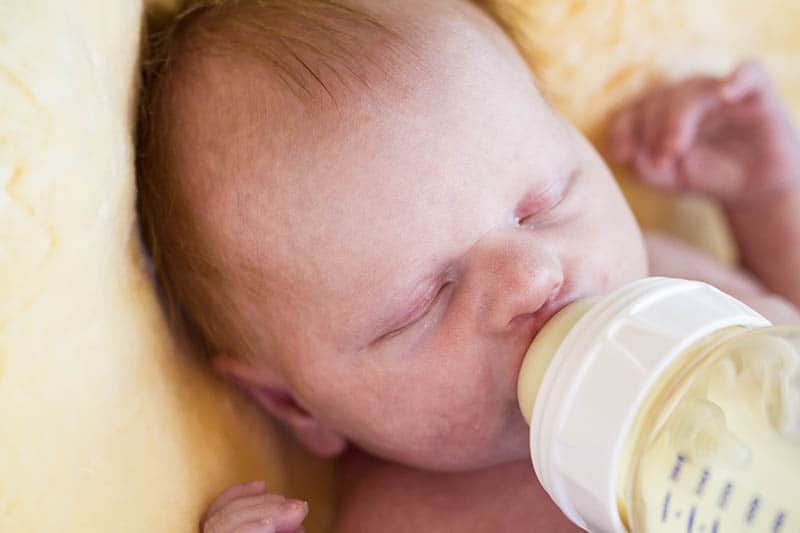
Look for hunger cues – early signs that your infant is ready to feed or starting to get hungry – such as:
- smacking his lips;
- opening his mouth;
- nuzzling against your chest;
- rooting (a newborn reflex that helps him to find and latch onto the nipple to feed – if you stroke his cheek or mouth, he turns his face toward the stimulus and makes sucking motions);
- moving his hands to his mouth;
- sucking on his hands or other things like your arm.
Contrary to belief, crying and fussiness are actually late signs of hunger, so it’s best to act proactively and feed him before he’s so hungry that he gets fussy and hard to calm down.
Don’t wait for him to start crying before offering the breast or bottle.
So, the sooner you learn to identify your baby’s cues, the sooner you can begin each feed – the less you have to deal with a cranky little one!
How do I know when my baby is full?
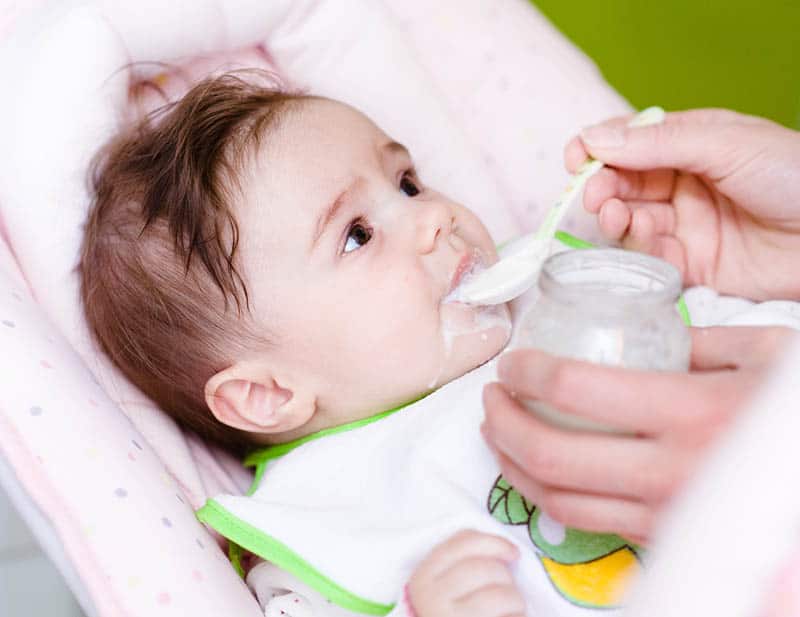
It’s time to end the feeding session when your little one shows the following signs:
- stops suckling;
- closes his mouth;
- lets go of and/or turns away from the nipple;
- closes his mouth;
- becomes fidgety and distracted.
However, these signs may not necessarily mean his tummy is full, but that he’s just taking a break or there’s a wind he needs to get rid of to make space for more milk.
To make sure, burp him and/or wait a minute or two, then try to offer the breast or bottle again.
Another indicator that your little one has had enough is when his sucking pattern slows down to four sucks to every swallow.
This usually means he’s not actually feeding anymore, but sucking for comfort.
How do I know if I’m overfeeding my baby?
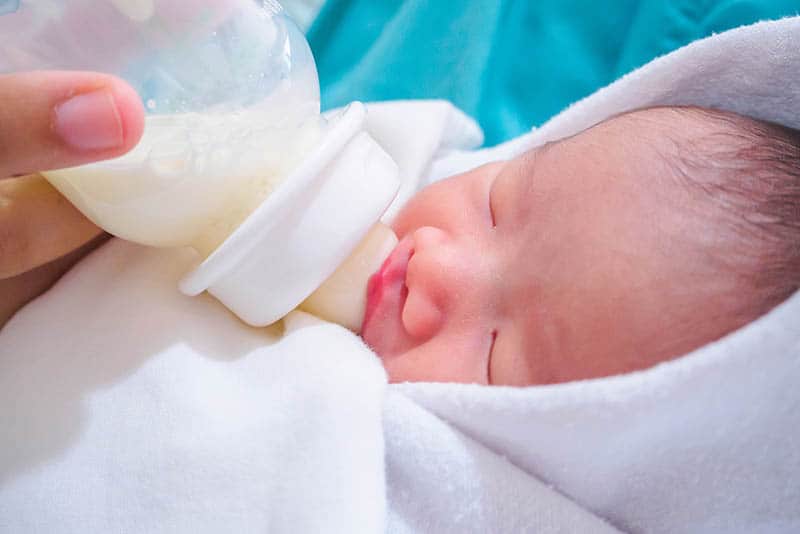
However, if your newborn is bottle-fed, there is a chance that he may consume a bit too much, because it’s easier to suck from a bottle than the breast.
If your baby does happen to overeat, you’ll know because he’ll likely end up with gas and tummy pain, or he might spit up or vomit shortly afterward.
While it’s true that overfeeding can increase the risk for obesity in later life, just because your infant is a bit on the heavy side now, it doesn’t necessarily mean that he is eating too much.
That being said, if you’ve got any worries about his eating habits, rather play it safe and talk to your pediatrician about it.
Should I wake my baby up for a feeding?

Don’t let him go without a feed for any longer than 4 to 5 hours.
How should I feed my baby during growth spurts?
Wondering why your baby seems hungrier than usual?
As your little one grows and gains weight, he’s able to handle more per feeding and go for longer between sessions.
RELATED: Ranking The 11 Best Baby Scales To Track Babies’ Growth
All the same, you may find times when he seems hungrier than his normal self.
If this is the case, your baby is likely going through one of his growth spurts (a period of rapid growth).
Growth spurts typically happen at these ages:
- 7-10 days old
- 3-6 weeks old
- 3 months old
- 6 months old
- 9 months old
When your baby is going through a growth spurt (and any other time he appears particularly hungry), follow his hunger cues and continue feeding him on demand (some babies want it every hour!) and adjusting the amount as needed.
What is cluster feeding?

Cluster feeding (also called bunch feeding) is what you do when your baby wants to eat more often than usual, and is common during the first month or two of your newborn’s life.
You’ll know your baby has this atypical feeding habit – although completely normal – in that there will be a definite increase in how frequently your baby feeds within a set period compared to before.
There are various possible reasons that may cause changes in your baby’s feeding pattern, some of which include slower milk flow (often at nighttime), if your little one is going through a growth spurt or developmental leap, nursing for comfort, teething, or illness.
While formula-fed babies are normally fed less often than their breastfed counterparts (as formula takes longer to digest than breast milk), formula-fed babies may also cluster feed, although often it’s not so much in the form of more frequent feeding, but rather wanting a little more at each feeding session.
And to nursing moms who worry that their baby is cluster feeding because of a low milk supply and therefore want to supplement with formula, I really want to encourage you to keep at it with nursing (however often baby wants to!) since it sends your body signals to supply more milk.
More demand, more milk. Less demand, the more you’ll need to supplement because your body isn’t getting those signals.
How can I tell if my baby is eating enough?
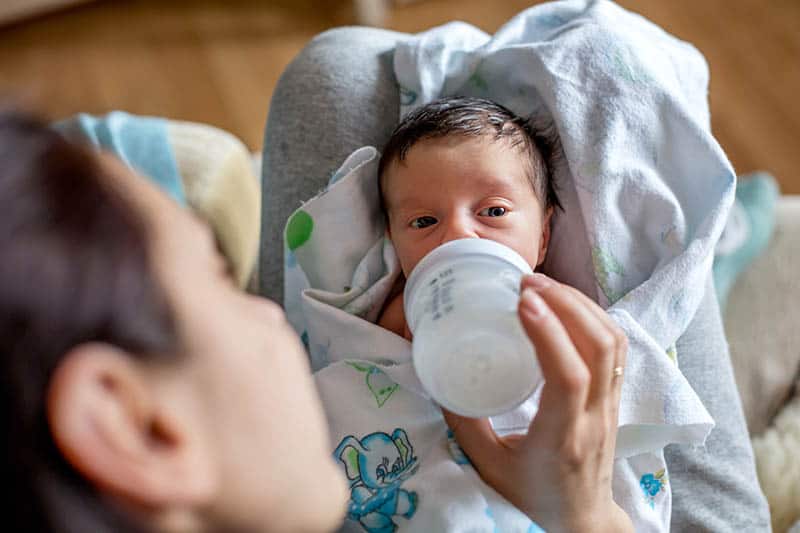
- If breastfeeding, you’re sure that you have an adequate breast milk supply.
- If formula feeding, your baby is drinking the recommended daily intake of formula as indicated by the particular brand.
- Your baby has frequent dirty and wet diapers (an average of 3 to 4 bowel movements per day, and pees after every feed).
- Your baby’s weight and size are as expected for their growth chart percentile.
There are also warning signs that your newborn may not be getting sufficient nutrition, at which point you should contact your pediatrician or lactation specialist:
- Your baby hasn’t regained his birth weight by 2 weeks old
- Your baby isn’t producing regular dirty and wet diapers (as stated above), and stools are consistently dark.
- Your baby eats less than 8 to 12 times within a 24-hour period.
- Baby still shows hunger cues after lengthy feeding.
- If breastfeeding, your milk doesn’t come in after day 3, and/or nursing is very painful throughout a feed.
Wrap Up

A newborn is a huge undertaking, so it’s understandable if the changes your little one will go through in the first few months get you a little flustered.
If you are still unsure or aren’t coping, be sure to talk to your healthcare provider for guidance.
All that’s left to say is: Enjoy this precious time with your new bundle of joy.
Yes, you’ll probably be nervous in the beginning, but know that there’s a lot of help out there, whether it be from friends and loved ones who’ve gone through the same, or professionals such as lactation consultants, pediatricians, and your family doctor.
Don’t be afraid to speak up if you need help. We all have to start somewhere!
And as I said in the beginning, before you know it, you will get into the feeding groove and look back wondering what all the fuss was about in the first place!
Want to know more about breastfeeding, bottle-feeding and pumping breast milk? Here you go, mama:
- Breastfeeding Essentials: 8 Lifesavers For New Moms
- Switching From Breast Milk To Formula: Step By Step Guide
- Spectra Vs Medela: Which Breast Pump Is Better For You?
References:
American Academy of Pediatrics, “Infant Food and Feeding”.
Like this article? Please share or pin it for later. You can also stay in the loop and follow us on Facebook, Instagram & Pinterest.
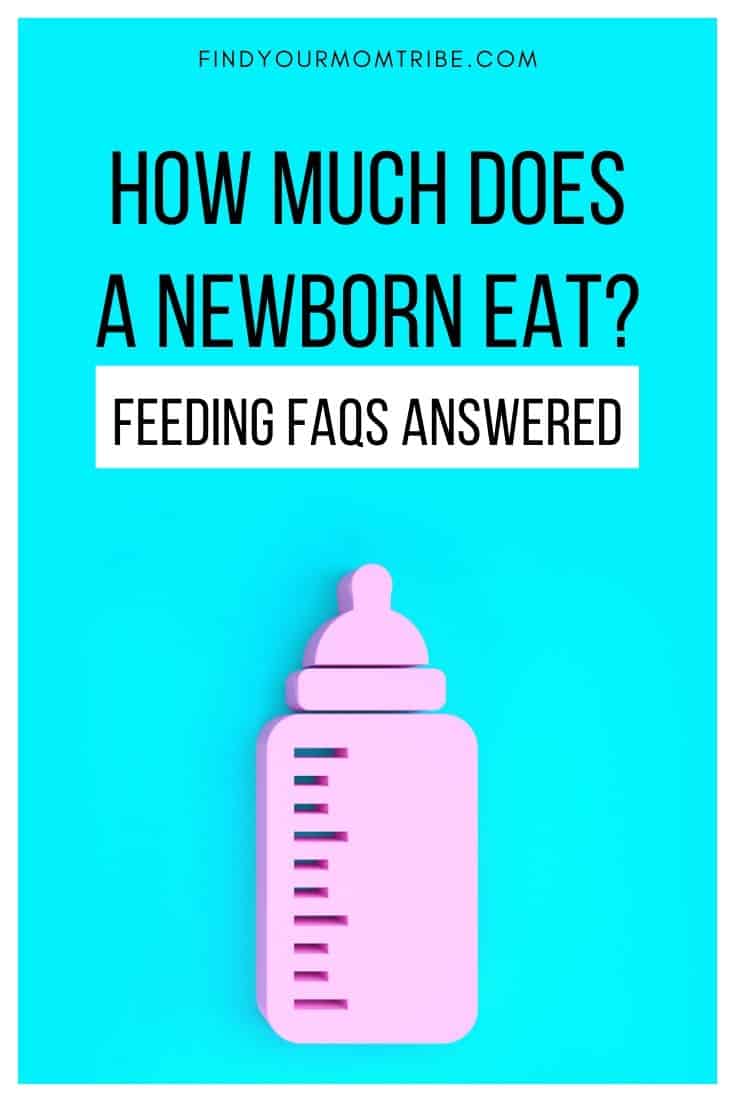
Disclosure: This post contains affiliate links. Please see our full disclosure for more info.

